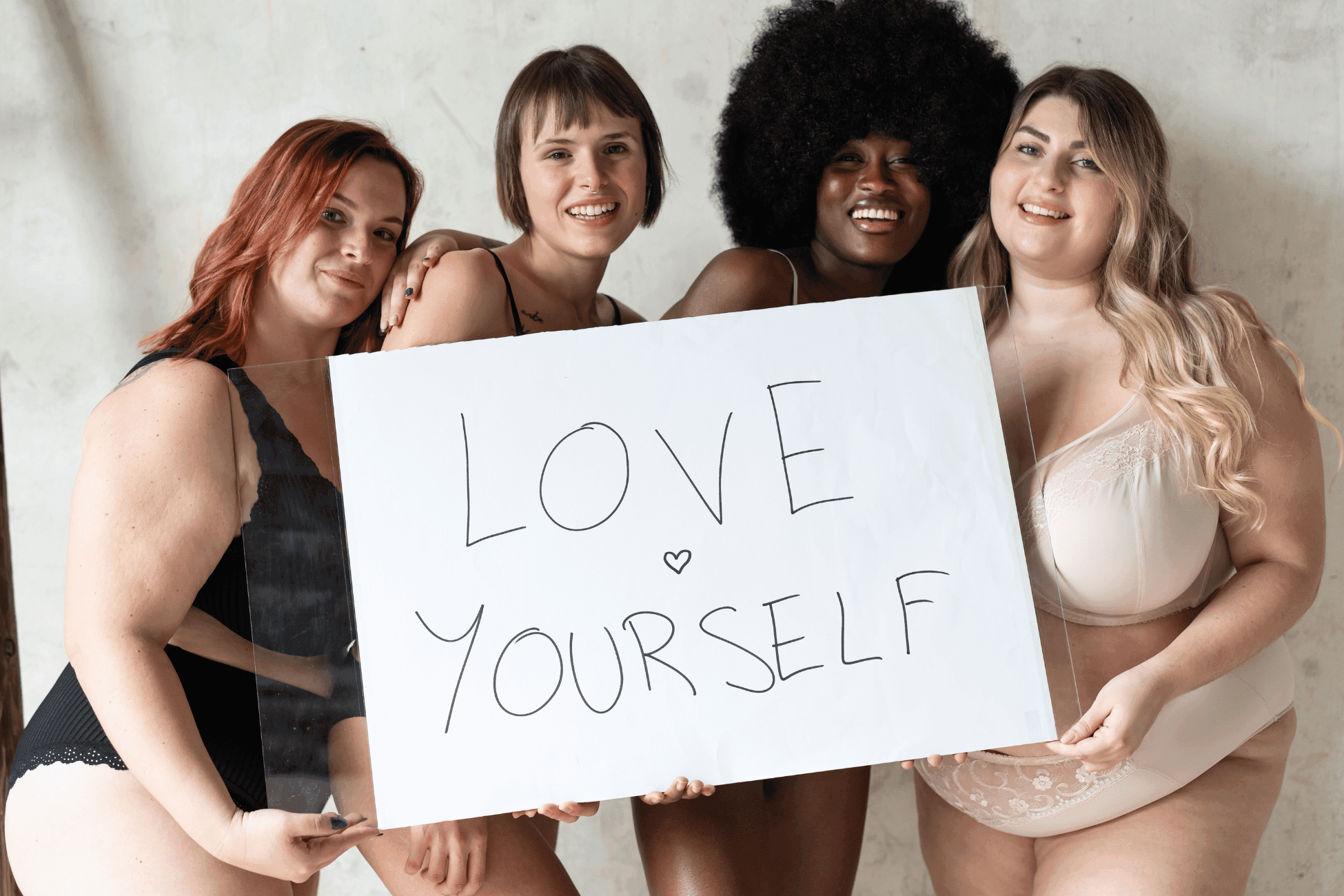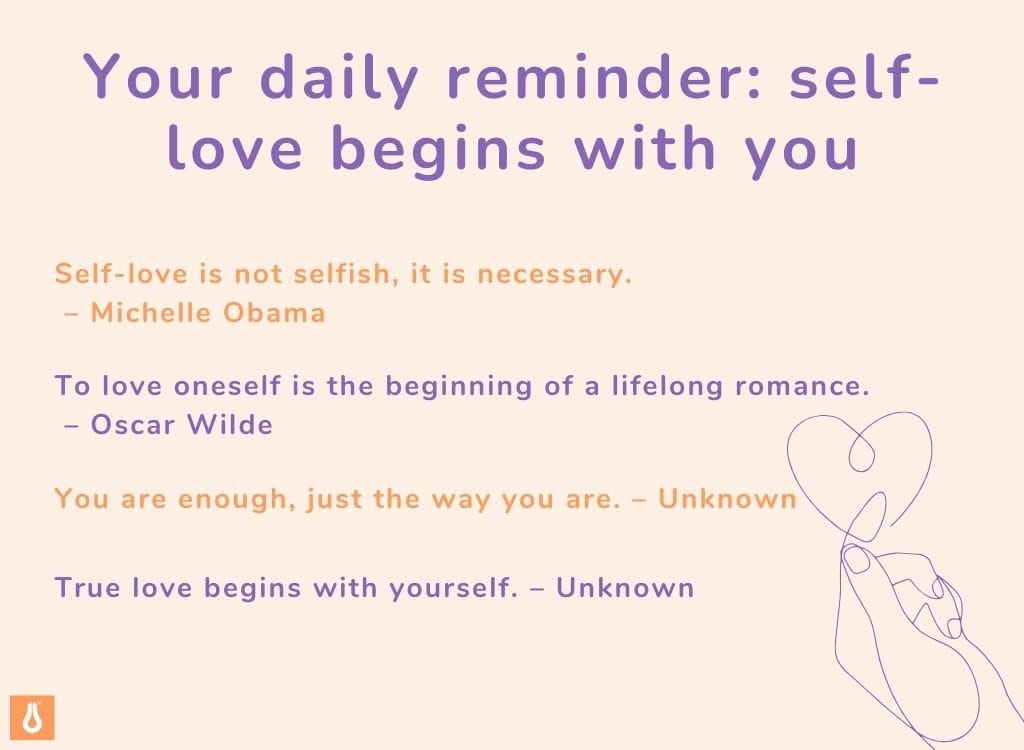
Exercise during your period – is that even possible?
23 de August de 2025
Pelvic floor exercises for women: important for body & wellbeing
20 de September de 2025
You probably know it well: that strict voice in your head that immediately criticises when you look in the mirror or make a mistake. Many of us struggle with this inner critic and forget to treat ourselves with kindness. Perhaps you often compare yourself to others, want to function perfectly and keep everything under control – until you’re out of breath. Yet self love is not a selfish luxury, but the foundation of your wellbeing and your mental health. It means meeting yourself with the same warmth and patience you would give your best friend. Sounds lovely, doesn’t it?
In this article, you’ll discover what self love really means and how to love yourself step by step. We’ll look at how positive thoughts and beliefs can change your life, and how to transform negative beliefs into positive ones. You’ll get practical tips on positive thinking, positive affirmation techniques, and we’ll share inspiring self-love quotes with you. And of course, it’s also about you and your body: how can you be especially mindful and caring with yourself during your period, in your menstrual phase? No complicated talk – just real everyday moments, introspective insights and an encouraging tone, so that you feel understood and supported. Let’s get started! 🧡
What is self love? (And why is it so important?)
Self love means appreciating yourself, accepting who you are, and treating yourself with care – in both good times and difficult ones. It’s about putting yourself first without elevating yourself above others. Many of us were taught to always put others’ needs before our own. Yet true self love has nothing to do with selfishness. Instead, it shows in those moments when you stop placing yourself at the very end of the line.
When you begin to treat yourself with kindness and understanding, you naturally set healthy boundaries, develop inner strength, and give yourself the security you may have been searching for elsewhere.
A loving relationship with yourself positively influences all areas of life: how you organise your daily routine, how you cope with anxiety and stress, and how you experience relationships. Self love means acceptance, not perfection. It doesn’t begin with anxious self-optimisation, but with an honest look at what you really need right now. It’s about taking yourself seriously as a human being with feelings and needs – with all your facets, flaws and wonders. This introspective mindset is the key to genuine self-worth and acts like an anchor for your mental health and emotional balance.

How to learn self love
You might be asking yourself: how can you actually learn self love? The good news is that self love isn’t a final state you achieve once and tick off forever – it’s an ongoing journey. Every day you can take small steps to get to know yourself better and to treat yourself with more kindness. Importantly, you don’t need to turn your whole life upside down. Self love begins in the small, everyday moments. Here are a few practical steps and tips to help you learn and live self love:
- Mindful self-care in daily life: Pay attention to yourself in the little things. Drink enough water because your body deserves to be well cared for. Choose food that truly nourishes you, instead of rushing through meals in stress or anxiety. Allow yourself breaks, even when the to-do list is still long. These seemingly small actions – sleeping enough, stretching, breathing deeply – are acts of self love that remind you: you are worth looking after.
- Your inner dialogue: Notice how you speak to yourself. Would you speak to a good friend that way? Probably not. Try softening your inner tone. When you make a mistake, tell yourself: “Okay, that didn’t go perfectly, but I can learn from it. I’m still good the way I am.” Building a compassionate inner voice takes practice, but it makes an enormous difference to your mental health and your ability to handle anxious moments.
- Saying “no” and setting boundaries: Learn to notice and respect your limits. It’s absolutely okay – in fact, vital – to sometimes say no to others so you can say yes to yourself. Not out of defiance, but because you are clear about your needs. You’re not responsible for everything and everyone. Each time you give yourself permission to step back, you strengthen your sense of self-worth. Setting boundaries is one of the most powerful positive affirmations you can embody: “I matter.”
- Accepting yourself as you are: Self love also means embracing all your emotions. Some days you’re full of energy and drive, others you feel tired or moody – and that’s okay. Don’t force yourself to be endlessly “positive” or “strong.” It’s perfectly fine to have weaker moments. By allowing yourself to experience sadness, anger or anxiety without judgement, you show yourself true compassion. Real positive thinking begins with recognising all of your feelings and then responding to yourself with kindness.
As you can see, learning self love is mostly about cultivating new habits in both thought and action. It’s the small, daily decisions that gradually build trust in yourself. Be patient – just as it took years to develop self-doubt, it will take time to form new, positive thoughts and beliefs. And now, let’s take a closer look at how to reshape those beliefs through positive affirmation and a more introspective mindset.
Learning positive thinking: transforming negative beliefs
Can you learn positive thinking? Yes – definitely! Optimism and a compassionate view of yourself are skills you can train, just like a muscle. Studies show that people with a more positive outlook are often healthier and more resilient to stress. But thinking more positively doesn’t mean ignoring problems or putting on a fake smile. It means consciously shifting your focus: away from constant self-blame and towards solution-focused, encouraging, positive thoughts that support your mental health.
The biggest obstacle is often deep-rooted negative beliefs – ideas about yourself that you’ve absorbed over many years (for example, “I’m not good enough” or “I don’t deserve better”). These patterns can weigh heavily on your life, but you can gradually turn them into positive beliefs. How does that work in practice? Here’s a simple plan you can try (it’s also a gentle lesson in how to love yourself):
- Notice your negative thoughts. Take an introspective moment and listen in: which sentences race through your mind automatically, especially in stressful, sad or anxiety-laden moments? Write them down. Seeing these inner saboteurs in black and white already takes away some of their power.
- Reality check! For each negative belief, ask: is that really true? Most of the time, the answer is no. The inner critic often exaggerates or distorts. For example: “I never get anything right.” Really? There are surely things you do well – remind yourself of them. Challenge the sweeping judgements.
- Reframe the belief. Find a statement that is more positive, or at least neutral and realistic. Crucially, it has to feel believable to you. A radical “I’m the greatest person alive” may not ring true – and that’s fine. Better might be turning “I do everything wrong” into “I do my best, and mistakes happen to everyone.” Change “No one likes me” to “Not everyone has to like me; the right people value me as I am.” This is self love in action.
- Anchor the new sentence – through repetition. Repeat your positive affirmation regularly, aloud or in writing. Stick it to your mirror or use it as your phone background. It may feel odd at first, but the more often you send yourself conscious, positive messages, the more these new beliefs take root. Be patient: you’re gently re-training your mind, and while it doesn’t happen overnight, it does work over time. You can even pair it with a line from your favourite self-love quotes as a daily reminder.
This technique – questioning negative beliefs and turning them into positive affirmations – is like mental training. Remember: the goal isn’t to fool yourself, but to develop a kinder, more constructive perspective on who you are. Allow yourself, step by step, to practise positive thinking. You’ll notice how your inner tone changes – and with it, your whole sense of life.
Inspiring self-love quotes
Sometimes a single sentence is enough to remind us how valuable we truly are. Self-love quotes act like small anchors in everyday life: they bring you back into the present moment and give you strength – especially on days when your inner critic is the loudest. They can help shift your focus away from anxiety and towards self love, positive thinking and more compassionate, positive thoughts.
Here’s a selection of beautiful quotes you can save, display, or use as a daily reminder:

Read these quotes several times and let their meaning sink in. You might like to note one or two down or place them somewhere visible. Such positive words can act like little lighthouses on difficult days – gentle reminders to be your own best friend, to practise self love, and to nurture your mental health through positive thoughts and affirmations.
Self love and your menstrual cycle
Your body is constantly changing throughout the cycle. There are days when you feel strong and full of energy, and others when you’re more sensitive and in need of rest. This is completely normal. Self love means accepting these fluctuations and not judging yourself for them.
Especially during your period, it’s important to be particularly gentle with yourself. Give yourself warmth, breaks, and little moments of comfort. Sometimes a walk in the fresh air or a yoga session helps; other times it simply feels good to rest with a hot water bottle and a cup of tea. Both are equally right – what matters is what feels good for you.
Even small details make a difference – like a warm bath in the evening or using a product that gives you peace of mind. With the PapayaCup or PapayaDisc you’re reliably protected and have fewer worries, so you can focus on yourself and give your body exactly what it needs.
Cycle awareness means taking yourself seriously and respecting your needs in every phase. That’s lived self love – and your body will thank you for it. 🧡
Our conclusion on self love
Self love is not a goal you eventually reach in perfection – it’s a lifelong journey that begins anew every single day. This journey is also one of self-discovery: you get to know yourself better and better, with all your highs and lows. It’s not about being happy every day, but about treating yourself honestly and compassionately – on both the good and the difficult days.
It’s the small everyday moments that make the difference: giving yourself five minutes of rest, listening to your body, or bravely saying no when things become too much. All of these are acts of love towards yourself, gentle reminders of how to love yourself in practice.
Never forget: you are the most important person in your life. Treat yourself that way. Be patient on your path and celebrate even the smallest steps forward. Even when setbacks come, remain gentle with yourself, get back up and keep going. You are valuable – exactly as you are in this very moment. And the more you embody this truth, the more it radiates out into the world as positive thoughts and energy.
Keep going and trust yourself: you’ve got this – every day, a little more. ❤
Frequently asked questions about self love (Q&A)
Self-love means accepting yourself and treating yourself with care – just as you would treat a good friend. It’s about taking your needs seriously, setting boundaries and approaching yourself with respect and affection.
You learn self-love step by step: through a kinder inner dialogue, intentionally taking breaks, healthy routines and dissolving negative beliefs. Small everyday actions like getting enough sleep or saying a clear “no” are already acts of self-love.
Yes! Positive thinking is like a muscle you can train. By identifying negative beliefs, turning them into positive affirmations and repeating them regularly, you can gradually change your mindset and develop more optimism.
First, become aware of your negative beliefs, such as “I’m not good enough”. Then question them: Is that really true? Rephrase them into something like “I’m doing my best, and that’s enough”. Repeat this positive sentence regularly so it becomes more firmly rooted in your thinking.
Your cycle affects your energy, mood and body awareness. Self-love means listening to your body’s signals and giving it what it needs in each phase – whether that’s rest, movement or warmth. Especially during your period, being mindful and allowing yourself to slow down without guilt is an act of self-love.



